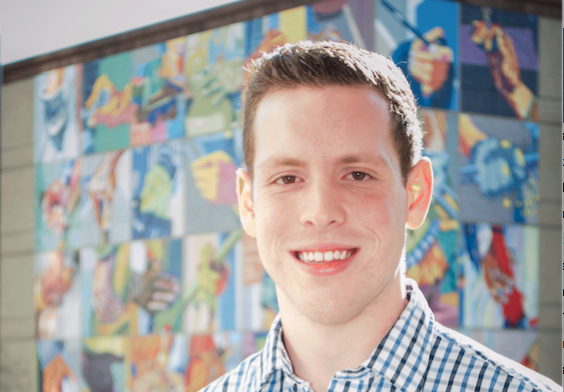Kyle Gundrum is the executive director at INTERalliance and co-founder of CityNova, and he’s only 24 years old. He also created and sold his own card game earlier this year (which we’ll get to at the end of the interview).
Needless to say, he’s an interesting guy who gets stuff done.
Since many of you are interested in college success, networking, and traveling, we’re lucky because Kyle is the man when it comes to these topics. As you’ll see in the interview, Kyle is a jack of all trades who excels at anything he puts his mind to.
Although we both live in Cincinnati, I didn’t know Kyle until we connected on social media and decided to get together for a sushi lunch. Thank God we did because Kyle and I hit it off so well sharing similar positive energy and ambition about many subjects.
On my way home from lunch, I immediately knew he’d be a great interview for the Take Your Success community.
If you’re looking for a good read in the topic of personal development and optimizing your life, you’re going to love this interview. Plus, remember to check out my key takeaway at the end.
——
Brian: During college, you were a full-time student with a full-time job, served as president of your fraternity, and had other responsibilities. How did you manage your time? Did you use any particular schedule, tools, or apps?
Kyle: Very carefully and intentionally. Managing my time felt like a job itself, as it was also important to me to have an active social life and travel frequently. Time management when you’re too busy is about conscious decisions, planning in advance, and often making sacrifices.
Generally once each month, I’d sit down and spend an hour or so thinking about my priorities and what I wanted to accomplish that month. I’d make a list (in order of priority) of what I needed to focus on. Then I’d use that as a guide as I made daily scheduling decisions.
List social time as a priority and decide where it falls—then actually follow the path you set for yourself. This means if your blog is priority #2 and social time is priority #4, sometimes you’re going to have to decide to stay in and write instead of going out with friends.
Or if you’re one of the people involved with 28 clubs in college, you might realize you just don’t have time to attend the meetings or actively contribute, which should be an indication maybe you should shed some commitments so you aren’t letting anyone down. Be willing to make sacrifices so you don’t drop the ball on your important goals… which requires knowing what should be sacrificed and what should be a priority.
Finally, I used technology quite a bit to stay on track. Google Calendar runs my life—if I lost access to my account, my life would be in turmoil. I put everything in it, including social time, exercise, time driving between places, etc.
This really helps in visualizing your schedule and knowing when it might be smart to work ahead because you have a few jam-packed days coming up.
I also suggest a to-do list manager like Wunderlist, GQueues, or Todoist… find what works for you and go with it. But definitely use one. You may be smart, but it’s impossible to remember everything.
Brian: Please tell us one of your biggest personal takeaways from your college experience. This could relate to personal-development, academics, social life, career, or anything else that comes to mind.
Kyle: My biggest college takeaway: decide what you want to get out of each year of college and pursue it.
For me, I earned a great GPA and attended most of my classes, but class wasn’t my biggest priority. As a lifelong independent learner, it’s not what I wanted to get out of college.
This opened up time for me, not to binge watch shows on Netflix, but to take on important roles in several organizations and to grow immensely as a person. I have never regretted this decision.
This comes with the caveat that everyone should pick their own priorities—I was a business student. Academics should probably always be the top priority of someone in engineering, architecture, or another more strenuous program.
Brian: What was it like to prepare for and give a TEDx Talk? (Readers, view the video here.)
Kyle: First of all, I was shocked to be invited. One of the founding TEDxUCincinnati team members is a longtime friend of mine, and she suggested I fill out their application to be a speaker. I was interviewed and invited to be a speaker, and then I spent weeks thinking about which topic I should cover amid the vast landscape of what’s important to me.
Then, once I picked my topic, I spent even more weeks thinking about the best way to convey my thoughts, as well as practicing my talk.
It was an honor to give a TEDx Talk, as I was able to share something incredibly important to me with hundreds of people. It helps now that the talk is on YouTube, as people still watch it and use it as a conversation starter when they meet me.
If you ever see TEDx coming to your community, definitely consider applying and speaking… you won’t regret it!
Brian: Honestly if you’re not the best networker I know, you’re in the top five. What are some tangible actions for Take Your Success readers to network better and expand their professional connections? We all know a large part in getting a job is who you know.
Kyle: My best networking advice? Don’t network. Let me explain.
Traditionally, “networking” is seen as adding people to your LinkedIn, collecting business cards, and grabbing coffee and talking about your career. This helps for sure, but it’s really wasting an opportunity to build deeper relationships with people.
Of course, you need to follow conventional networking advice. Connect via social media with influencers in your field. Go to relevant events, career fairs, and meetups. Try to get the contact information and follow up with everyone you meet.
But MY #1 networking tip… make it personal. This doesn’t mean you need to ask probing questions that’ll make people uncomfortable—don’t do that. But rather than just asking people what they do for their job and reciting for them the top half of your resume… ask them why they chose their career field. Why they enjoy it, what irritates them about it. How they like living in their city. Who mentored them along the way. Then ask them if you could consider them a mentor as you navigate your career.
This is the beginning of a long-term, mutually beneficial relationship in which they feel invested in your success. So much better than the same old cookie-cutter career fair conversation.
Brian: Everyone loves to travel, especially young adults. But from my experience, money is the number one roadblock. So how do you travel all the time for cheap and what can we learn?
Kyle: I’m actually working on a comprehensive and very, very long post about this, I’ll send you a link when it’s published so you can amend this. For now: use Google Flights, Momondo, and Skyscanner to find cheap flights, and don’t forget to look for low-cost carriers like Allegiant and Frontier. Megabus is often a great option as well.
If you’re going to a large city (or anywhere in Europe!), consider staying in a hostel. It may be intimidating at first, but I’ve stayed in 25+ hostel in North America and Europe, and I’ve never had a bad experience. Often I have a better experience in hostels than I would have in a hotel. And you can usually snag a hostel for $15-25/night.
Look for Groupons for cheap things to do while you’re there—or better yet, read local newspapers for free events (or Google “free things to do in ______”). Eat at local places rather than expensive tourist traps. Since you’re staying at a hostel now, ask the people at the front desk or other travelers what to do and where to eat because they’ll have money-saving tips for you.
The most helpful overarching tip is to be flexible. You might be able to save $75 if you leave a day earlier or come back a few days later… or save the trip for a few months later. Stay at a hostel because do you really need daily room service and branded bottles of cheap shampoo?
Brian: You left your first job out of school at General Electric to pursue another career route. Why did you make this decision?
Kyle: Don’t get me wrong: GE was great. I loved my job and I was super lucky to be selected for it. At this time in my life, Corporate America just wasn’t for me. My dad is an entrepreneur and I’ve worked for small companies and non-profits since I was 16. It was challenging for me to transition to one of the largest companies in the world with 300k+ employees.
I personally like knowing everything about all of the projects going on at work and personally knowing all of the employees. That’s not possible at such a huge company.
So while I would say there are amazing opportunities at large companies most people would love… I’m a really unique case and it wasn’t for me. (Maybe I’ll feel differently when I’m older and a more stable, consistent job might be more attractive!)
Brian: What are you up to now? How can readers learn more?
Kyle: I’m working tirelessly on my startup CityNova, which showcases local entertainment options and inspires readers to experience new things.
We also made a Cincinnati-themed unofficial Cards Against Humanity game called When Pigs Fly. It’s not an expansion deck, it’s a complete game with 300 cards of unique Cincinnati-specific content. The game’s launch was incredible, as it was covered by pretty much every media outlet in Cincinnati with more to come… and we’re getting a lot of positive feedback on the game.
I’m also going back to school this fall for a master’s degree in Information Technology and just took a role with a nonprofit organization called INTERalliance of Greater Cincinnati as its Executive Director.
I post things on CityNova’s site all the time, and feel free to connect with me on Twitter!
——
(Brian is back.) After Kyle Gundrum’s insightful interview, I could have highlighted many different themes.
But I want to focus on the one that stood out to me the most. And that’s how intentional Kyle is in everything he does. He acts with a deliberate purpose and it pays off, that’s for sure.
In every response, from his college priority list to travel hacks, he’s planned ahead to get the most out of his time, energy, or money.
These intentions give his mind something to focus on, which helps him execute his goal and get more out of the opportunity.
So I want to encourage and challenge you to be more intentional going forward.
What are your intentions at school in the fall? If you’re just going because you’re supposed to, then you’re not getting the most out of it. Be intentional to run for the leadership team of a student org, find a career you’re passionate about, or get a high grade point average and admissions test score for grad school.
What are your intentions at work? If you don’t have any other intentions than to get paid, you’re leaving a lot of benefits on the table. Be intentional to network (remember to keep it personal), learn from more experienced employees, or find a mentor.
Make it a habit to be intentional and you’ll find success. I believe in you!
Related: How To Minimalist Pack Like A Pro



